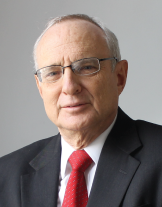Rabbi David Saperstein considers himself one of the luckiest people in his field. He has worked most of his life toward advancing and aiding religion’s role in the world, both through his personal desire of becoming a rabbi and by involving himself in foreign policy work.
“The fact that someone had actually hired me to do the work that was a passion of my heart …” Saperstein said, “the fact that I was able to do that in a professional as well as private capacity, is truly one of the great blessings of my life.”

Saperstein serves as the senior adviser for policy and strategy for the Reform Jewish movement, the largest Jewish denomination in the U.S. He also works on the international level on a variety of non-governmental organizations, addressing religious intolerance and interfaith cooperation. In addition to his current work, Saperstein is former ambassador for the Office of International Religious Freedom.
He is speaking at 2 p.m. Monday, June 27, in the Hall of Philosophy to open the Interfaith Lecture Series: “America’s Global Conscience,” with a lecture titled “The World at a Crossroads: Religion’s Insights and Priority, Concerns and American Foreign Policy.” Saperstein said he credits Chautauquans for having broad interests and the ability to engage. He has learned “never to predict” where the conversation will go, but he does have a clear plan of how to guide this year’s discourse.
“I want to give a brief overview of how religion has interacted with American foreign policies from the very beginning of the history of our country, and the role that religion has played in shaping American foreign policy sensibilities,” Saperstein said. “I’m going to explore what are some of the key roles (of) religion (that) can be value-added in pursuing our goals abroad, religion’s role in helping address issues of conflict, and conflict resolution.”
Saperstein said he and his colleagues work to address issues that religious communities face, such as the growth of anti-Semitism and Islamophobia, and plan to meet with Uyghur and Rohingya Muslims, as well as groups that persecute Christians. Saperstein said he drew heavily on these issues when preparing for his lecture.
“Across the globe, there are some religion-specific issues that need to be woven into American policy,” Saperstein said.
He wants to take these issues and bring them together to “clarify what America’s global conscience should be.” In doing this, he considered religious communities and what they have to provide in terms of foreign policy.
“Religious communities have important insights to offer on the values America should cherish, and have a significant value added to helping foreign policy experts understand how religion is interwoven into so many of the central challenges that America faces at a global level,” Saperstein said.
He said religion’s role in foreign policy touches on work like “assisting with refugees; supporting refugees and displaced populations; addressing climate change and the pursuit of stronger human rights; and democracy across the globe.”
In the last six weeks, he has traveled to Saudi Arabia, Qatar, Ghana and Morocco to build stronger interfaith cooperation. He will bring all of this to his lecture at Chautauqua.
Saperstein has spoken at Chautauqua numerous times and said “it’s always a wonderful adventure.” His takeaway message for Chautauquans on America’s role in the global community is: “This really does feel like a crossroads moment.”




